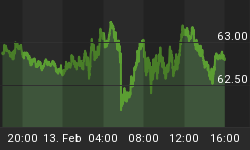CURRENT SITUATION - The financial markets continue to power ahead. Stocks are rising, commodities have begun the next advance in their bull-market and even the bond-market is strong! It seems that investors in every asset-class are convinced about the soundness of their judgement, but history reminds us that someone will be very wrong!
So, are the bond investors being fooled into believing that inflation isn't a problem? Or are the equity punters wrong about the coming interest-rate cuts and a soft landing in the US? Perhaps, the commodities camp is naïve and we are in fact witnessing a gigantic bubble in natural resources.
Amidst all these diverse views, my own money lies in the inflationary camp (commodities and emerging-market equities) and I suspect that the bond-investors will be the ones who get badly hurt. After all, central banks around the world continue to churn out a ridiculous amount of paper, otherwise known as money. Inflation (money-supply and credit growth) is spiralling out of control and all this excess liquidity is causing prices to rise all around us, thereby diminishing the purchasing power of our savings. So far, central banks (through their propaganda and skewed inflation figures) have managed to keep the public's inflationary fears under check. However, once the masses wake up to the inflation menace, there will be a stampede out of "paper" causing interest-rates to soar and the bond-market will sink like a rock. The same drama unfolded during the 1970's and I suspect history will repeat itself over the coming years.
Those who believe in a deflationary collapse don't understand our monetary system. Today, central banks have the freedom, the ability and the motive to print an endless amount of money, which will avoid any deflationary bust-ups at least in the immediate future. A more likely outcome is that thanks to the money-printing prowess of Mr. Bernanke and his counterparts elsewhere in the world, the purchasing power of all the "paper" currencies will continue to fall against tangible assets and eventually the entire monetary-system may come into question.
You must understand that banks are in the business of lending money and inflation benefits them immensely. The higher the rate of inflation (money-supply and credit growth), the bigger their profits from collecting interest on the issued loans. Moreover, inflation also keeps a segment of the public happy (at least those who have the ability to invest) as their assets continue to rise, thereby giving the illusion of prosperity. So, the hidden agenda of the central banks and politicians is to create and encourage inflation, whilst telling the public that they are in fact fighting inflation! I may add that during highly inflationary times, it is always the majority of the public which suffers badly as their savings, incomes and pensions continue to erode in value. So, in order to protect your wealth, you must avoid the "safe haven" of cash and invest in assets that are likely to benefit from the ongoing monetary insanity.
These days, the consensus view is that the interest-rate in the US will fall over the coming months as the Federal Reserve steps in to support the US economy. In my view, the Fed Funds rate may actually rise around April-May next year.
Firstly, despite the hikes since 2004, the Fed Funds rate is still close to the bottom of its 30-year range (Figure 1). So, the notion that the interest-rate is "too high" is totally absurd. In fact, I would argue that given the degree of inflation we have seen in the US since 2001, the Fed Funds rate is shockingly low!
Figure 1: Fed Funds rate still extremely low!
Source: Economagic
More importantly, if my assessment about the markets is correct, commodities (especially gold and silver) will advance over the coming months and test their highs recorded earlier this year in May and the US dollar will decline to its low recorded in December 2004. Such an outcome will cause inflationary fears to return with a vengeance and the Federal Reserve will raise its interest-rate.
The prime objective of any central bank is to protect its merchandise (the currency it issues) and the Federal Reserve will do everything in its power to prevent a total collapse of the US dollar. In theory, a higher yield is supposed to make a currency more attractive, so the Federal Reserve is likely to increase the interest-rate at the cost of the US economy. Such an unexpected move will probably send the financial and property markets into yet another painful correction phase during the next summer.
On a brighter note, we still have a good stretch ahead of us and I expect the markets to remain strong until towards the end of the first quarter next year. At this stage, our managed accounts are fully invested in the commodities complex and emerging-markets. However, depending on the market conditions prevalent early next year, we will start to lock-in our gains by going into money-market funds and bonds for a few months.
The above is an excerpt from Money Matters, a monthly economic publication, which highlights extraordinary investment opportunities in all major markets. In addition to the monthly reports, subscribers also benefit from timely and concise "Email Updates", which are sent out when an important development in the capital markets warrants immediate attention. Subscribe Today!
















